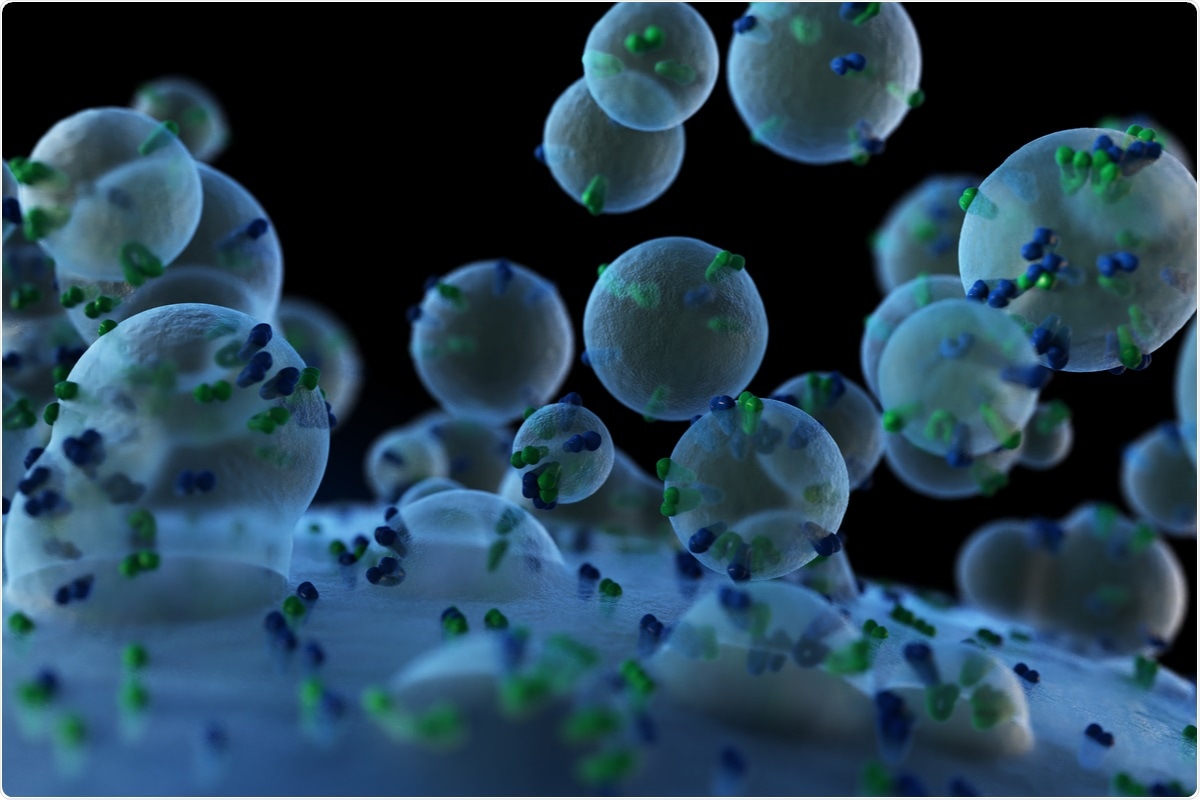Anti-SARS-CoV-2 EVs were also capable of suppressing lentivirus pseudotyped with a variety of VOC spike proteins, along with infectious SARS-CoV-2. The characterization of this modality, as well as its capacity to block SARS-CoV-2 infection, is demonstrated in this work, which also includes a unique proof-of-concept antiviral for COVID-19.

Study: Engineered extracellular vesicles directed to the spike protein inhibit SARS-CoV-2. Image Credit: Jason Drees / Shutterstock.com
Background
The severe acute respiratory syndrome coronavirus 2 (SARS-CoV-2) first emerged in December 2019 and is the causative agent of coronavirus disease 2019 (COVID-19). To combat the current pandemic, several vaccines were developed and have since been demonstrated impressive efficacy against severe disease.
Due to vaccine hesitancy, the emergence of several SARS-CoV-2 variants of concern (VOCs), and waning neutralizing antibody levels, COVID-19 cases will continue to rise and fall around the world. This will subsequently require the development of novel approaches capable of treating active SARS-CoV-2 infection.
There are currently no approved effective antiviral therapies for COVID-19; however, classical antiviral medications like remdesivir and monoclonal antibody therapies like REGN-CoV-2 have received emergency use authorization (EUA) from various regulatory bodies around the world. One protease inhibitor, PF-00835231, has recently shown promise in preclinical testing, whereas two other medications including paxlovid and molnupiravir have been approved for treating COVID-19 patients by the European Union.
SARS-CoV-2 enters target cells through the S1 and S2 subunits of its spike protein. The S1 subunit contains the receptor-binding domain (RBD) that interacts with the host angiotensin-converting enzyme 2 (ACE2) receptor on the cell surface to begin infection. Comparatively, the S2 subunit is reorganized into a fusogenic form as a result of this interaction, which is further matured by transmembrane serine protease 2 (TMPRSS2).
Engineered EVs
EVs can be engulfed by cells in a non-specific approach; however, these compounds prefer to be taken up by cells that are identical to the ones that produced them. EVs with a specific receptor agonist, single-chain variable fragment (scFv), or nanobodies inserted in the extracellular membrane of the CD63 EV-associated protein are one way to bias EV uptake to a specific cell type.
To achieve this, the authors of the current study first established the best extracellular loop and location for embedding the targeting protein into CD63. To make a series of N6-scFv fusion constructs, they used an scFv generated from the broadly neutralizing N6 antibody that targets HIV-1 gp160.
The N6-CD63 fusion hybrids were then implanted into human embryonic kidney (HEK293) cells. Proven differential ultracentrifugation techniques to extract and isolate EVs, which contained the exosome portion that was enriched with CD63 expression.
The researchers were then interested in determining whether the Ex2.4 locus was resistant to other targeted techniques. A camelid-derived nanobody, which is a single-domain heavy-chain variable region (VHH), was embedded into the Ex2.4 site. A VHH requires only one heavy chain to bond to its cognate target, thus making it a straightforward and concise way to make fusion constructions.
VHH72, which was originally created for SARS-CoV-1, targets a unique area that sterically prevents spike interaction with the ACE2 receptor and, when expressed in a bivalent configuration, can neutralize SARS-CoV-2.
EV-mediated neutralization of SARS-CoV-2
To ascertain whether the EVs could neutralize active SARS-CoV-2 infection, the authors conducted neutralization assays in a live-virus challenge with a sample of the wild-type strain. As compared to the CD63 control, the EVs reduced infection in a dose-dependent manner. The VHH72-CD63 EVs were subsequently used in a live-virus challenge with the SARS-CoV-2 Delta, Beta, and Kappa VOCs.
With the ancestral strain, significant neutralization was shown at over 1x108 total particles; thus, the initial dose of 5x108 EV particles was utilized and substantial VOC neutralization was observed. Comparatively, higher doses of VHH72-CD63 EVs did not significantly increase inhibition.
Taken together, these findings reveal that VHH72-CD63 EVs can reduce live SARS-CoV-2 VOCs by directly inhibiting the spike protein.
Implications
The current study contributes to the expanding versatility of tetraspanins by demonstrating that antibody-derived components can be directly inserted into CD63 to target functional receptors. In addition, the EC1 of CD63 has been exploited for protein presentation, which was confirmed in this work.
A more detailed analysis of the loops revealed that alternative areas may have better properties for protein presentation, thereby demonstrating CD63's plasticity. Previous studies have revealed that shortened CD63 variants may still be functional in EVs and only require transmembrane 3 for integration, thereby indicating that CD63 is a very pliable and compact mechanism for ligand enrichment.
Journal reference:
- Scott, T. A., Supramaniam, A., Idris, A., et al. (2022). Engineered extracellular vesicles directed to the spike protein inhibit SARS-CoV-2. Molecular therapy Methods & Clinical Development 24; 355-366. doi:10.1016/j.omtm.2022.01.015